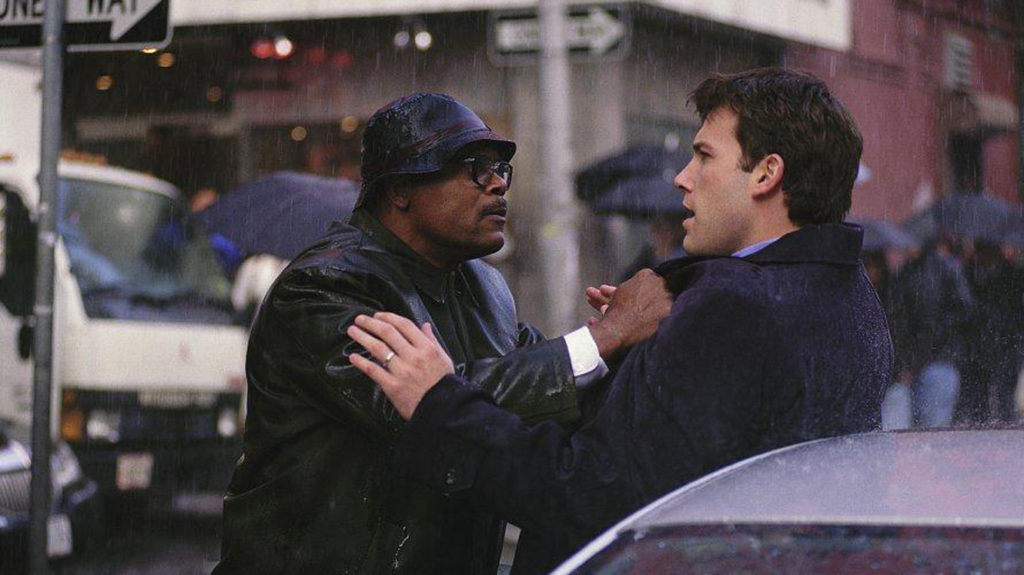
We all know that our lives are deeply interwoven with those people who share our time and space. But every once in a while something happens that jolts us into a greater appreciation of how entwined we truly are. Just such a moment happens to Doyle and Gavin when a fender bender on New York City’s FDR Drive brings both of their lives up short. Neither man is injured in any way by their collision, at least not physically. But the events that follow reveal how fragile their hopes, dreams and self-made plans really are.
Doyle sells insurance for a living. Gavin is a lawyer. Both are racing to make court appearances on that fateful morn, but for vastly different reasons. Doyle is embroiled in a custody dispute with his ex-wife (she wants to takes the kids to Oregon; he wants his family close at hand). Gavin is delivering important probate documents for his firm. Sidelined on the FDR, Doyle misses his hearing, and thus his chance to save his family. Gavin misplaces his file folder and arrives in court empty handed. Doyle wants his life back. Gavin wants his file. But instead of meeting in the middle like gentlemen, the two individuals escalate their conflict from a simple fender bender into cruel criminal attacks, and even attempted murder.
positive elements: Hands down, the most positive element in Changing Lanes is Doyle’s love and devotion for his children. He blew it in the past, but he’s eager to write a new future. “Boys need a father,” he pleads with the judge. “I love my boys.” A recovering alcoholic, Doyle makes great strides to prove himself to his wife and kids. He tries to buy them a house. He pledges not to drink and faithfully attends AA meetings (some of the film’s most compelling scenes show Doyle fighting to “stay on the wagon”). He works hard to provide a steady income.
spiritual content: Gavin wanders into a Catholic church and demands that a priest enlighten him with purpose for his life. “I came in here for some meaning,” he blurts. “I want you to give the world meaning for me.” Unfortunately, he’s not really interested in turning to God for assistance; he just wants to lash out at someone. His conclusion about God’s role in his life is that “sometimes God just likes to put two guys in a paper bag and let ’er rip.” Gavin’s boss embraces relativism to excuse his immoral and criminal behaviors, telling Gavin, “I can live with myself because at the end of the day, I think I do more good than harm. What other standard have I got to judge by?” Meanwhile, Doyle prays, “God grant me the strength to accept the things I cannot change.”
sexual content: It is implied that Gavin cheats on his wife, and that’s she perfectly okay with his bad behavior as long as he brings home the big paychecks.
violent content: Sabotage to Gavin’s car results in a bone-jarring accident (his second wreck of the day). When a bank denies Doyle’s loan application, Doyle loses his cool and heaves a computer terminal across the room. Defending himself against what he believes to be threatening individuals, Doyle attacks two men and pummels them until they’re lying on the ground crying for mercy. Security guards scuffle with Doyle at his sons’ school before handcuffing him and dragging him down the hallway.
crude or profane language: A few quick flurries of vulgar language generate about 20 f- and s-words, each of which stick out like a red flag in an otherwise reasonably restrained script. Six milder profanities and as many misuses of the Lord’s name are also used.
drug and alcohol content: Doyle’s journey out of alcohol addiction is a positive portrayal. One long segment focuses on him sitting at a bar with a glass of bourbon in front of him, desperately trying not to drink it. He even calls his AA sponsor for help.
other negative elements: Gavin’s wife encourages him to continue cheating and lying to support their high standard of living. His law firm forges documents to swindle a family out of their money. Gavin blackmails his bosses so that he can do pro bono work for the poor.
conclusion: Despite Samuel L. Jackson’s presence, Changing Lanes isn’t an action film. It’s more of a psychological thriller (without much thrill). While I understand the idea of escalating road rage, Doyle and Gavin’s interactions defy logical progression and the pair skyrockets from one altercation—be it verbal or otherwise—to another without exercising even half the brains God gave them (Falling Down, anyone?). Note to Gavin: Instead of dropping $5,000 on a computer hacker to obliterate Doyle’s credit history, why not offer Doyle the money in exchange for the file? As an attorney, Gavin should be expected to exhibit a few more problem-solving skills than your average 8-year-old. A self-proclaimed man of conviction and compassion, Doyle exhibits an astonishing disconnect between his values and his actions. Throughout the movie, suspension of disbelief is stretched beyond acceptable limits. Especially in the ending, which—while offering hope and resolution—hinges far too loosely on the events which just transpired. That said, director Roger Michell does do a superb job of communicating, through his cinematography, feelings of loss, loneliness and bewilderment.
This is a morality tale in terms of showing the destruction caused by stumbling blindly (without thought and without godly wisdom) through life, haplessly bouncing off of those around us like billiard balls. It’s also an exposé on how people interact with the concepts of right and wrong when they’re divorced from God’s absolute truth. And if Changing Lanes’ treatment of human interactions had been even slightly more believable, it would have made for an interesting spiritual study. As it is, it’s just too much of a stretch to make any solid applications. Add to that its vulgar language, violence and relativistic attitudes and I’d advise families to drive right on by.
